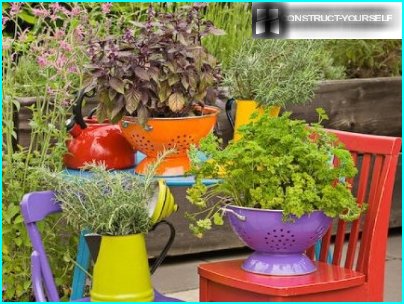
In the country can do without some of the frills, but without the bright sun, creating a positive mood flowerbeds country life will lose its basic flavor. Creating Sunny flower beds, you must ensure that each of the plants received their share of light. It is important to combine plants, choosing them for growth. Then high instances will effectively rise above low-growing crops, creating for them a winning background.
The contents
Silk magic Turkish poppies
Bright, light, equipped with a unique silk petals are similar to clothes of the Eastern sultans, the Turkish poppy (Papaver orientale) are a great addition to any Sunny flowerbed. His environment can be maintained not only in scarlet or purple colors go perfectly with poppies flowers with white or yellow color. Exotic beauty makes the Mac a very popular plant for decoration of flower beds. But not only it. This is the most undemanding plant. If Mac gets enough sunlight, then grow it can be years without a transplant and on any soil.
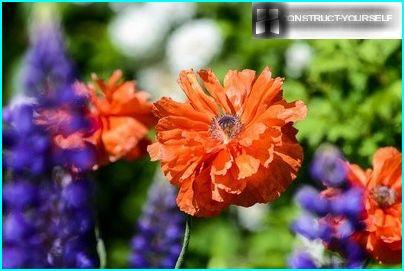
Turkish poppy is a perennial plant, its direct bristly stem can reach a height of 80-100 cm Basal poppy leaves large, pinnatisect, up to 30 cm in length, stem — a smaller size. Single flowers up to 18 cm in diameter have a fiery red color and a black spot at the base
Poppies can be not only red, there are garden forms with orange, pink or even white petals. There is a special dressing-a kind of plants of this species with bright red drooping flowers. This plant blooms in late may and early June, after which its yellowing leaves better to remove. Holes in the flower bed should be covered with asters, blooming in autumn. A poppy at this time forms a small rosette of leaves, which will have to spend the winter. Company Mac can be the yarrow and oregano.
The unique aroma of lavender
The perfect setting for a bright Sunny flower beds will create lavender (Lavandula) is not only ornamental, but medicinal and aromatic plant. Those who managed to see the lavender at its peak of flowering, can never refuse her attractive fresh scent and delicate purple flowers. Flowering lavender – stunner, especially if it is planting a large area. This perennial small size always ready to cover the ridges and borders. Evergreen lavender – Bush with narrow leaves, which have soft silvery hue. Its inflorescence has the shape of an ear.
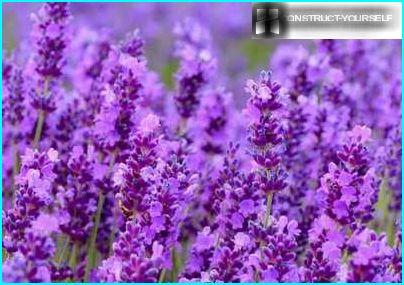
Butterflies bees really like the scent emitted by the lavender-honey plant. The plant is unpretentious, it is drought-resistant and growing it in regions with warm and long summers is not much complexity
Lavender flowers can be only purple (from pale lilac to rich purple), and pink, blue and even white color. Purple varietal of lavender is often combined with bright «cancelable» positive yellow or orange coloring. If framing a composition is lavender, it looks lovely, for example, Echinacea purpurea. Flowering time depends on the type of lavender. Some varieties bloom from may to July. At the end of summer, they can attack a second phase of flowering. Usually the plant does not live longer than ten years, so it is important to prepare a replacement.
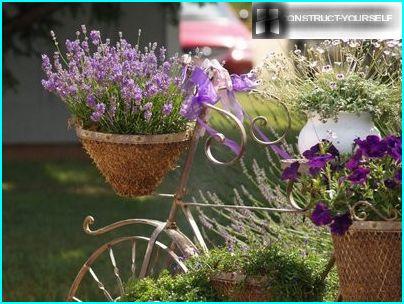
The Latin word «lava» means «wash». The name of the plant received for its antiseptic and hygienic properties. In Ancient Rome lavender was used during the washing, cleaning and washing
Unforgettable fine-leaved peony
In 60 years this plant can be seen in many urban flowerbeds. And now, after all these years, fine-leaved peony (Paeonia tenuifolia) was again at the peak of popularity. Voronet, and that’s exactly what this plant is called in Russia, often bloom in early may. Usually the may day holiday, he has encouraged all its blood-red blossoms. Its delicate fragrance is woven into a nice spring breeze and heard far around. Once in nature, these flowers can be found all flowering glades, and today they are listed in the Red book.
However, as garden plants, the fine-leaved peony quite often. In adulthood, a Bush funnel grows to 30-50 cm it is Usually richly decorated with flowering shoots. The flowers bloom very well, so during flowering it is very beautiful and fragrant. Unfortunately, this period is not so long. In June it will be completed, especially in hot weather. But the delicate greens will remain with us until the autumn. Often the fine-leaved peonies planted together with Carpathian bells, monogamy, kniphofia, the gelenium, PPE cloves, rudbeckia and bright coreopsis.
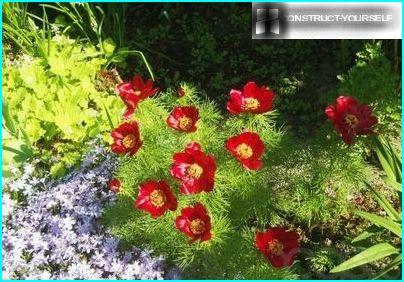
You can, of course, to dwell on the usual rabid forms, they are also interesting, but this species of peony are especially attracted his herbs. She is nice and together with the flower, and as a General background for plants that are below the peony growth
Purslane – colored rug in your cottage
The name of purslane (Portulaca oleracea) is derived from the Latin word «portula», meaning «wicket». Where are the posts in this plant? Turns out his seed capsule opens like reveal a small wicket, opening the way for future mats. After all, the people of purslane called mats. Today in some European countries, it regenerates and grows as a field weed. Our gardeners purslane subdued his tenderness and naive, unpretentious beauty. He was a welcome guest in every flower bed. His love for the continuous and abundant flowering from June to August.
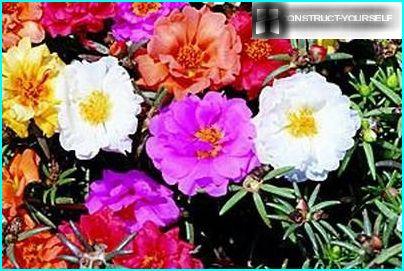
In the Middle ages it was cultivated by the Arabs, calling purslane «a blessed plant». It was believed that he was able to cure all diseases. Demand was purslane in the days of Hippocrates. Severe wounds and snake bites were treated with leaves and flowers of purslane
Purslane is most often used as border plants and in rock gardens. It has a small cylindrical fleshy leaves green or slightly reddish color. Flowers with a diameter of 2.5-3 cm have a variety of colors: yellow, red, purple, pink, orange, etc. Attract the attention of specialists in plants with double («Double Mix»), white («White»), Magenta («Splendens») colors. There are even those who have corollas painted in two colors.
Colorful and delicate chamomile
You can grow many exotic plants, but, if your garden is no ordinary Daisy (Leucanthemum vulgare Lam), who’s so unique to smile the sun in the morning? And who will answer our main question about love and not love? No, not chamomile. Especially in the presence of Turkish poppy and blue cornflower, chamomile creates a field color, which is a nice refresh of the site, will make it the native heart and pleasant look. Perfectly with leucanthemum vulgare (Daisy), forest mallow, chamomile Aster, scabious, yarrow, Bellflower and meadow sage.
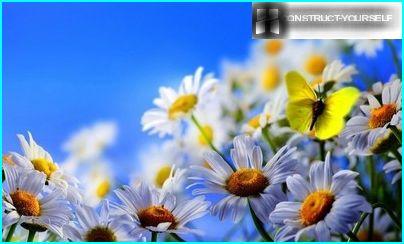
This plant is often used in folk medicine. However, haphazard use of it like any other drug, not worth it
In fact, white chamomile flower will always find a pleasant neighborhood. Chamomile is a perennial plant that is tall maybe 15 and 80 cm Its stem may be branched or simple single. Inflorescence of chamomile has the shape of a basket. Blossoms in June-September. This plant is propagated not only by seeds, which each instance produces in the amount of 2-5 thousand pieces, but also vegetatively. Winter Daisy may in the form of a rosette, and the following year she had already formed flowering stems.
Shaggy and fragrant monarda
If you know a lot about good drinks, try to add only one leaf monarda (Monarda) in a Cup of any tea, and you will suddenly experience the exquisite taste of Earl grey. Experts say that this plant is able to cheer up the space just by their presence. Monarda – «hooligan» among «intelligent» flowers with neat hairstyles. Her tousled hair, however, is always appropriate. She doesn’t get lost amid other plants, but would not allow anyone else to drown.
Monarda flowers can be double and simple. All kinds of this plant have an exceptional fragrance that exude not only flowers and leaves but also the stems and even the roots. «Shaggy» the flowers are lilac, crimson, pink, red and even white appear in July. Abundant flowering is not terminated until the end of the summer.
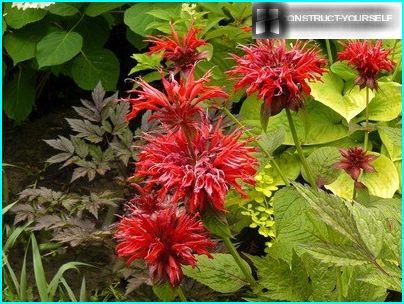
Bee balm reaches a height of 120 cm and A dwarf form, not rising more than 20-30 cm from the plant’s Leaves can be smooth or rough depending on variety
Multiplying the sun gelenium
When gelenium (Helenium autumnale) blooms, it seems that autumn sun has multiplied and turned to you many inflorescences. Really want to stoop to these flowers, to feel their smell. The plant are very diverse. Known many different varieties of gelenium, which differ not only in colours but also in height, with a diameter of inflorescences baskets. The average diameter of flower is 4 cm as for the color, the gelenium can be yellow, bright red, yellow-orange, red or bronze with contrasting dark heart of the flower.
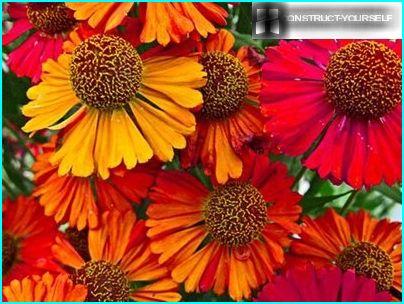
This plant is very well combined with other, so pick the company gelenium — no problem. Especially good it looks with rudbeckia and Echinacea. Often it replace the traditional flowers of the asters and gladioli in bouquets, which give teachers the Knowledge Day
Gelenium blooms in August-September. It pleases with its bright flowering until the first frosts. In the fall, when the die stem gelenium, the root dies with him. But why, then, this plant is considered a perennial? It turns out that by the end of the growing season at the base of the stem is formed Bud, which develops into a little a new socket with roots and leaves. It will give spring a new flowering stem. What seemed a single flower, in fact, turned into a colony of separate plants.
Exotic African kniphofia
To see the exotics and enjoy their bloom, there is no need to go somewhere far away. Kniphofia (Kniphofia) – another lover of the sun, born in Africa, which has taken root in the us. This herbaceous perennial is incredibly attractive in the period of its flowering. From the very center of the leafy rosette of a sudden there is a high stem, devoid of leaves, decorated with spike-like inflorescence. The buds begin to blossom gradually or top-down or bottom-up. And soon, the entire inflorescence turns into a big soft lump.
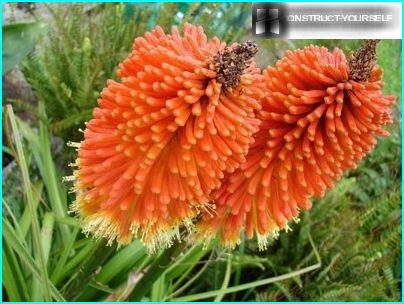
Planting kniphofia, please be patient. In the first year of flowering, will the plant produce flowers in the second or even the third year. But your wait will be justified
However, even without flowers, this plant looks very exotic. It will be an ornament to any flower bed or the perfect backdrop for a more undersized syntelabo. It blooms from mid-summer till October. Kniphofia can become the centre of your flower beds, because it reaches a height of 120 cm Plant easily «make friends» with Echinacea, the Sedum, yarrow and other.
Lush bowls of garden chrysanthemums
You heard something about autumn depression and really want to feel what it’s like? Then banish from your garden plot of chrysanthemums! Because they will not let you get bored even on a rainy October day. Lovely garden chrysanthemum (Chrysanthemum) – this is a real classic suburban areas. Generic name chrysanthemum comes from two Greek words. First «chrysos» means gold, and the second «anthos» — a flower. It is difficult to argue, it’s really Golden flowers.
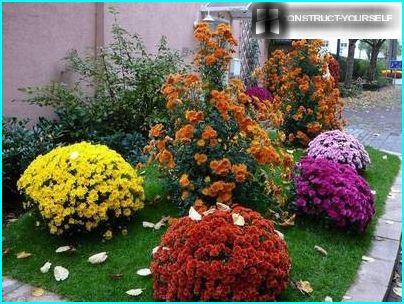
There are 650 different varieties of garden chrysanthemums, which are separated by the types of inflorescence in 13 groups. Among the sectional meet pinnate, bristly, poponne, semi-double, anemone, and chrysanthemum legkoobratimy fantasy with elongated petals
It is impossible not to feel in my soul a quiet peace, when this plant smiles on their magnificent heads in the cooling autumn sun. Their company with pleasure will divide Sedum or shrub asters. Together they will delight you with the rich colors of autumn. And you can say goodbye to my flourishing garden to the new summer season, enjoying the tart, slightly bitter and cold fragrance of chrysanthemum.
For those who want to decorate with chrysanthemums your site, you should know that the flowers have the same name, are very different in the shape of bushes, the height, size of flowers, type of inflorescence, degree of double, colour and even by the time of its flowering. If the height of some of them does not exceed 35-40 cm, others are able to grow up to 1.5 meters. Chrysanthemums chrysanthemums are very diverse and color: white, pink, yellow, red, wine red, Sunny orange and even green. Moreover, shades of the same color presented very well.
A flower, born from a star
Once the Greeks decided that asters (Aster) appeared out of the dust, fallen from the stars. That’s why they named this flower in honor of his mother – star. Indeed, the asters with its radiant petals that radiate in all directions, and resemble stars. About this sun-loving Queen of the garden it is impossible not to mention.
Varietal perennial asters are able to surprise the abundant blooms and variety of colors. There among the asters, lilac, mauve, purple, crimson, blue, blue, pink and of course white copies. Every lover of flowers will find those that he will like. Tall goldenrod will receive a winning frame in the form of purple or blue perennial asters. Together they will look very impressive. And the quilting in pink Crocus will flower bed that will delight you with freshness and beauty until the first snow.
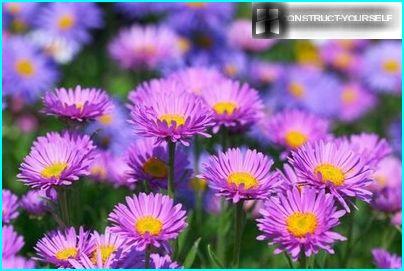
Beauty asters are manifested when the garden season comes to an end. It was then that hardy asters and bloom in all the splendor of its unearthly beauty
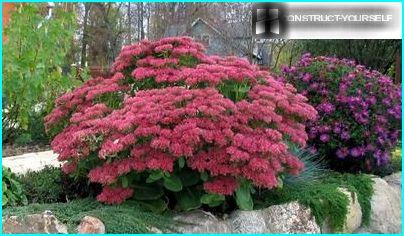
Due to the diversity of asters are very easy to combine. For example, pink varieties look great next to the English. White Aster will complement the purple stonecrop «Purple Emperor» or «Madonna»
Sun flower bed that you will be first created in your imagination and then with your hands. Shaping it, I hope you will not forget about the plants that we have dedicated this article. Let there are no specific recommendations on planting and care. Our goal is to show you these plants and select them for your garden and learn more about them you own.






